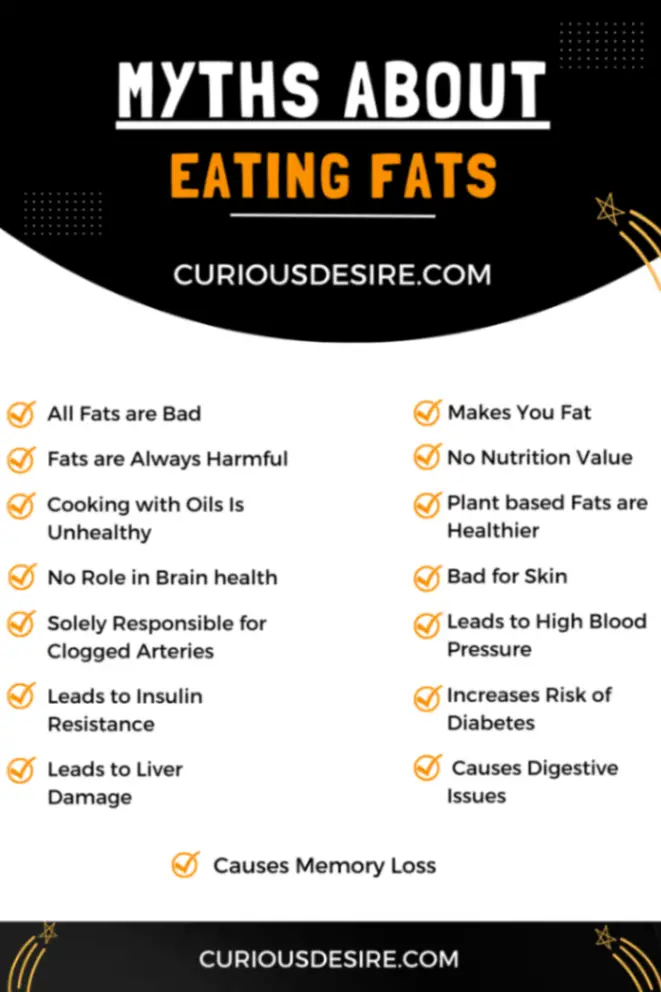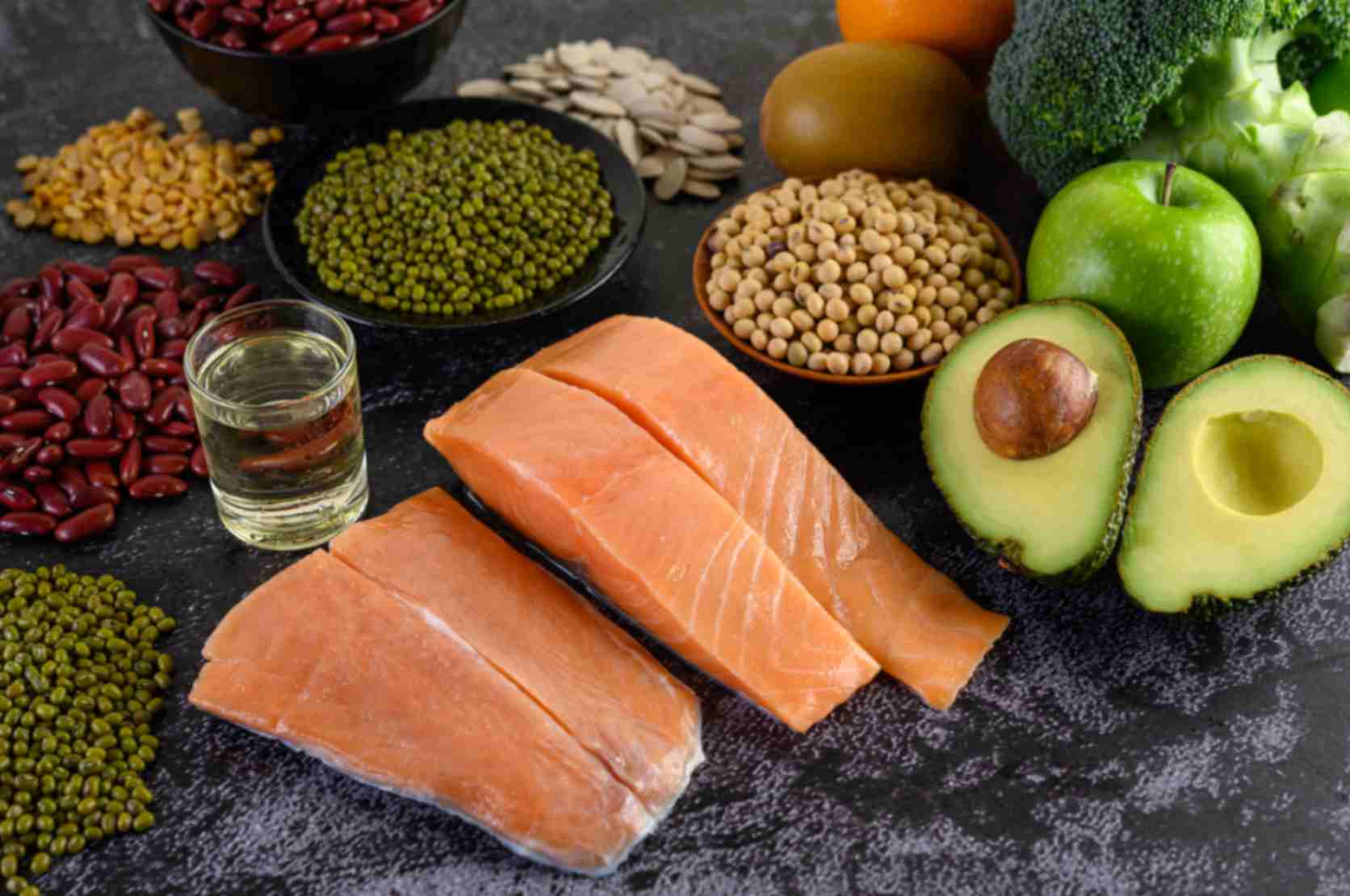In recent years, fats have been the subject of much controversy.
For decades, fats have been vilified as the primary culprit behind various health issues, ranging from heart disease to weight gain.
However, as research has progressed, many of these beliefs have been debunked.
Here are 20 prevalent misconceptions regarding dietary fat and cholesterol that merit dispelling.
5 most common myths about eating fats:
- Eating fat makes you fat
- Fats have no nutritional value
- Fats have no role in brain health
- Fats cause digestive issues
- Plant-based fats are always healthier than animal-based fats

Myth 1: All Fats Are Bad for You
One of the most pervasive myths surrounding fats is the belief that all fats are inherently unhealthy.
While it’s true that certain types of fats, such as trans fats, can have detrimental effects on health, not all fats fall into this category.
Some fats are essential for maintaining optimal health.
Healthy fats, such as those found in avocados, nuts, seeds, and fatty fish, are rich in omega-3 and omega-6 fatty acids, which play crucial roles in brain function, heart health, and inflammation regulation.
Fats absorb fat-soluble vitamins like A, D, E, and K.
Myth 2: Eating Fat Makes You Fat
Another common misconception is the belief that consuming dietary fat leads to weight gain.
Weight gain occurs when there is an imbalance between calorie intake and expenditure, regardless of the macronutrient composition of the diet.
Healthy fats can help you feel fuller for longer, reducing the likelihood of overeating.
Myth 3: Saturated Fats Are Always Harmful
Saturated fats have long been demonized for their purported role in increasing cholesterol levels and contributing to heart disease.
While it’s true that excessive intake of certain sources of saturated fats can have adverse effects on heart health, not all saturated fats are created equal.
Sources of saturated fats like coconut oil and dairy products contain medium-chain triglycerides (MCTs), associated with various health benefits, including improved cognitive function and weight management.
Recent research concluded no association between saturated fat intake and heart disease.
Myth 4: Fat-Free Diets are the Healthiest Option
Some believe cutting out fats is the healthiest option for weight loss and well-being.
However, fats are crucial in various bodily functions, including hormone production, nutrient absorption, and brain health.
A diet that eliminates fats can lead to deficiencies and other health issues. Instead, focus on incorporating healthy fats in moderation as part of a balanced diet.
Fat plays a crucial role in flavor and texture, and when removed from foods, they often become less satisfying, leading to overconsumption of other less nutritious foods.
Instead of focusing solely on the fat content of foods, it’s important to consider the overall nutrient profile and opt for whole, minimally processed foods whenever possible.
Myth 5: Fats Have No Nutritional Value
This myth is a common misconception that overlooks the essential role that fats play in our diets and overall health.
- Energy Source: Fats are a concentrated source of energy. They provide 9 calories per gram, making them the most energy-dense macronutrient.
- Nutrient Absorption: Certain vitamins, such as A, D, E, and K, are fat-soluble, meaning they require dietary fats for absorption. Without sufficient fat intake, the body may struggle to absorb these essential vitamins.
- Cellular Structure: Fats are integral components of cell membranes. They help maintain membrane integrity and fluidity, ensuring proper cell function and communication.
- Hormone Production: Fats are precursors to various hormones and signaling molecules in the body. For instance, cholesterol, a type of lipid, serves as a building block for steroid hormones like testosterone, estrogen, and cortisol.
Myth 6: Cooking With Oils Is Unhealthy
This myth stems from the misconception that cooking oils are inherently detrimental to health.
While it’s true that some cooking oils can become less stable and form harmful compounds when exposed to high heat, not all oils are created equal.
Certain oils, such as olive oil and avocado oil, have higher smoke points and are more suitable for cooking at higher temperatures.
Using moderate amounts of healthy oils in cooking can enhance the flavor and nutrient absorption of foods.
It’s essential to choose cooking oils wisely and practice proper cooking techniques to minimize the formation of harmful compounds while reaping the benefits of healthy fats.

Myth 7: Plant-Based Fats Are Always Healthier Than Animal Fats
This myth oversimplifies the distinction between plant-based and animal-based fats.
While it’s true that many plant-based fats offer numerous health benefits, not all plant-based fats are automatically healthier than animal fats.
For example, some processed plant-based oils may contain high levels of unhealthy trans fats or undergo refining processes that strip away their nutritional value.
On the other hand, certain animal fats, such as those found in fatty fish like salmon or pasture-raised meats, provide valuable nutrients like omega-3 fatty acids and vitamin D.
A balanced approach that includes a variety of healthy fats from both plant and animal sources is optimal for overall health and well-being.
Myth 8: Fats Have No Role in Brain Health
Contrary to this myth, fats play a crucial role in brain health.
The brain is composed of about 60% fat, and dietary fats are essential for maintaining its structure and function.
Omega-3 fatty acids, in particular, found in fatty fish like salmon, walnuts, and flaxseeds, are known for their neuroprotective properties.
These fats are important for forming cell membranes in the brain, supporting neurotransmitter function, and promoting overall cognitive health.
Adequate intake of healthy fats is vital for optimal brain function, memory, and mood regulation.
Myth 9: Fats Are Bad for Your Skin
While excessive consumption of unhealthy fats, such as trans fats and saturated fats from processed foods, can contribute to skin issues like inflammation and acne, not all fats are detrimental to skin health.
Certain healthy fats are essential for maintaining healthy, glowing skin.
Omega-3 fatty acids found in fatty fish, flaxseeds, and chia seeds, for example, have anti-inflammatory properties that can help reduce skin inflammation and promote a clear complexion.
Monounsaturated fats found in foods like avocados and olive oil provide essential nutrients and hydration to the skin, helping to maintain its elasticity and moisture balance.
Myth 10: Fats Are Solely Responsible for Clogged Arteries
Excessive consumption of certain types of fats, such as trans fats and saturated fats, can contribute to the buildup of plaque in arteries, they are not the sole culprits behind clogged arteries.
Other factors, such as genetics, smoking, high blood pressure, and inflammation, also play significant roles in the development of atherosclerosis.
Moreover, not all fats have the same impact on heart health.
Healthy fats, such as monounsaturated and polyunsaturated fats found in foods like nuts, seeds, and fatty fish, have been shown to have protective effects on heart health by reducing inflammation and improving cholesterol levels.
It’s important to focus on consuming a balanced diet rich in healthy fats while minimizing intake of unhealthy fats.
Myth 11: Eating Fats Leads to High Blood Pressure
This myth is a common misconception that oversimplifies the complex relationship between dietary fats and blood pressure regulation.
Mono- and polyunsaturated fats, found in foods like olive oil, nuts, and fatty fish, have been associated with beneficial effects on blood pressure.
Focusing on overall dietary patterns, including reducing sodium intake and increasing consumption of fruits, vegetables, and whole grains, is crucial for managing blood pressure.
Myth 12: Consuming Fats Leads to Insulin Resistance
Insulin resistance is a condition where cells become less responsive to insulin, leading to impaired glucose uptake and elevated blood sugar levels.
While excessive intake of certain types of fats, particularly saturated and trans fats, may contribute to insulin resistance and type 2 diabetes, not all fats have this effect.
Healthy fats, such as monounsaturated and polyunsaturated fats, can improve insulin sensitivity and metabolic health when incorporated into a balanced diet.
Studies indicate that consuming whole foods, particularly those containing healthy fats, and engaging in regular physical activity are linked to a reduced risk of insulin resistance and type 2 diabetes.
Myth 13: Eating Fats Will Increase Your Risk of Diabetes
While diets high in unhealthy fats, such as saturated and trans fats, may increase the risk of type 2 diabetes, replacing them with healthier fats can have beneficial effects.
Healthy fats, such as those found in nuts, seeds, olive oil, and fatty fish, have been associated with a reduced risk of type 2 diabetes when included as part of a balanced diet.
It’s important to consider the overall dietary pattern, including the quality and quantity of carbohydrates, proteins, and fats, along with lifestyle factors, when assessing diabetes risk.
Consume These: Food Sources Abundant in Beneficial Fats
Here is a list of 10 foods that are high in healthy fats:
1. Avocado
2. Nuts and Seeds
3. Fatty Fish
4. Olive Oil
5. Coconut Oil
6. Flaxseeds
7. Chia Seeds:
8. Dark Chocolate
9. Eggs
10. Full-fat Dairy
Don’t Consume These: Foods High in Unhealthy Fats
Foods high in unhealthy fats include:
1. Fast Food
2. Processed Meats
3. Pastries and Baked Goods
4. Packaged Snacks
5. Fried Foods
6. Dairy Products
7. Margarine
8. Frozen Meals
9. Commercially Baked Goods
10. Processed Spreads and Dips
Conclusion
It’s time to dispel the myths surrounding fats and embrace them as a vital component of a healthy diet.
By understanding the different types of fats and their effects on the body, you can make informed choices that support your overall well-being.
Remember, a balanced diet that includes a variety of healthy fats, along with other essential nutrients, is key to maintaining optimal health.
So, next time you hear a fat-related myth, you’ll be equipped with the knowledge to separate fact from fiction.
Myths About Eating Fats FAQs
1. Do all fats contribute to weight gain?
Not all fats contribute to weight gain. Healthy fats, like those found in nuts, seeds, avocados, and fatty fish, can aid in weight management by promoting satiety and providing essential nutrients.
2. Are all low-fat products healthier choices?
Not necessarily. Many low-fat products compensate for reduced fat content by increasing sugar or other unhealthy additives, which can be detrimental to health. It’s essential to consider the overall nutritional profile of a product rather than just its fat content.
3. Are all fats high in calories?
Fats are calorie-dense, containing nine calories per gram compared to four calories per gram in carbohydrates and proteins. However, choosing healthier fats and consuming them in appropriate portions can still be part of a balanced diet.
4. Can fats improve brain health?
Yes, certain fats, such as omega-3 fatty acids found in fatty fish, walnuts, and flaxseeds, are essential for brain health and cognitive function. Including these fats in your diet may help support memory and overall brain function.
5. Are all plant-based fats healthy?
While many plant-based fats are healthy, not all are created equal. Some vegetable oils, such as olive, avocado, and flaxseed oils, are rich in monounsaturated or polyunsaturated fats and are beneficial for health
6. Do fats affect cholesterol levels?
Yes, certain fats can affect cholesterol levels. Saturated and trans fats can raise LDL (bad) cholesterol levels, while unsaturated fats, particularly polyunsaturated fats, can help lower LDL cholesterol when used to replace saturated and trans fats in the diet.
